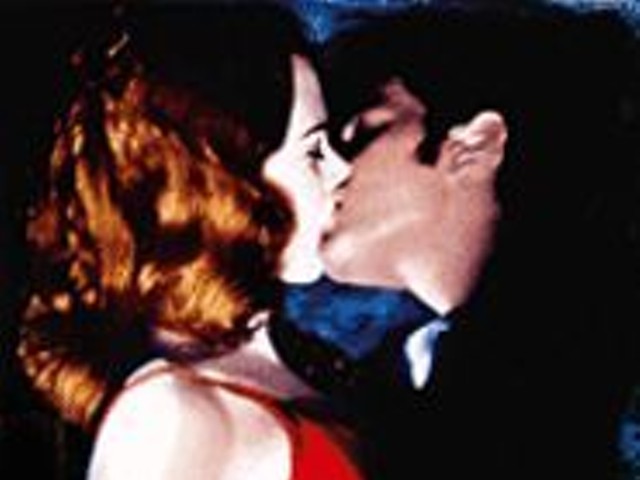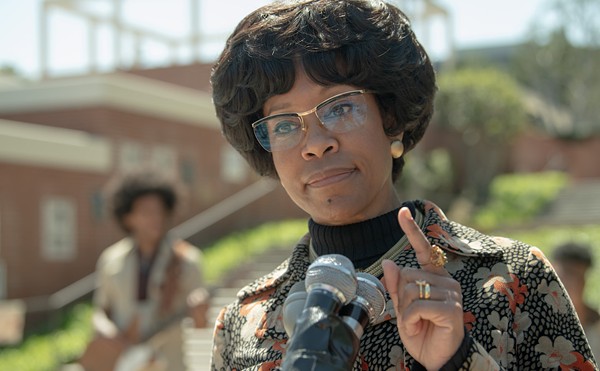All sarcasm aside, anyone who's ever worked in an art house knows that many customers show up knowing nothing about any of the movies, then demand a refund when their blind choice turns out to be insufficiently "arty." Fewer and further between are the indie films you can feel safe taking your conservative friends and elders to see. This week, however, salvation is at hand. Behold The Man Who Cried, an "old-school" art film straight out of a how-to textbook: The movie delivers high culture (opera), actors with accents (Cate Blanchett doing Russian, Christina Ricci English and Johnny Depp a vague kind of generic European), a period setting (World War II), inoffensive social sentiment (Nazis and other prejudiced people are bad) and, of course, lots of costumes. All from Sally Potter, the director of Orlando and The Tango Lesson, no less. If this is what you like, have at it. If not, there's always that movie about planes bombing a harbor.
Now, how about that title? Women dreaming of a sensitive man are bound to be drawn by it, especially knowing that Johnny Depp is in the film. So perhaps it should be noted that, though Depp does shed tears once, the verb cry in this case primarily refers to using one's singing voice (though the double meaning is no doubt intentional). In fact, because two male singers "cry," the title could refer to any of three main characters. Debate this among yourselves; it may be the only point to cause any controversy.
The first man who cries is simply known as Father (Oleg Yankovsky), a Russian Jew who sings to his young daughter, Suzie (Claudia Lander Duke, who grows up to be Christina Ricci). When poverty grips their small, snowy village, Father heads to America to make some real money for his family. Then, when anti-Semitism causes the village to be burned down, Suzie escapes on a wagon and gets shipped off to England to live with a foster family that aggressively tries to make her assimilate, to which she responds with a subdued rampage, systematically smashing the glass in every one of their picture frames. The only person who understands her is an authoritarian music teacher, who confides that "they wouldn't let me speak Welsh, either, but it did me a world of good." Before long, Suzie is a teen with a great singing voice (courtesy of Iva Bittova) and an English accent, and she's on her way to Paris to become a chorus girl, which she hopes is a step in the right direction toward America.
In a case of mixed blessings, Suzie ends up rooming with the annoying Russian blabbermouth Lola (Blanchett), who enthusiastically declares, "We will share everything, everything!" and apparently originates what will one day become that bestselling 1990s book The Rules ("There are rules of how you get your man ... you have to play hard to get"). Still, her talent for flirting gets her hooked up with a bombastic Italian opera star, Dante Dominio (a wildly overacting John Turturro, with singing voice by Salvatore Licitra), who gets Lola and Suzie small parts in his current stage production, presided over by the eternally amenable Felix Perlman (Harry Dean Stanton). Rounding out the cast of the opera are some Gypsies and their horses, and wouldn't you know it, one of the Gypsies just happens to be a sensuous hunk who teaches uptight heroine Suzie how to relax by having sex with her. It is, of course, Depp, who seems to have walked directly off the set of Chocolat, remaining in character and costume but ditching the Irish accent for a more continental one.
Dante, being the pompous and ignorant diva that he is, resents the Gypsies, especially when their horses defecate at inopportune moments. He also likes Mussolini, likening Blackshirt rallies to opera. So when the Nazis come marching into Paris, he immediately makes friends and rats out the truth about Suzie's Russian-Jewish heritage. It's time for Suzie to leave, but only if she can tear herself away from the smoldering Gypsy passion of Mr. Depp.
There's nothing particularly wrong with this whole setup; it's just very by-the-numbers. All the actors do fine with their accents, and although Depp is not very convincing (he seems to be on autopilot -- that, or the only direction Potter gave him was "Look intense!"), the other actors are. The problem is, there's no dramatic tension. Getting out from under the watchful eye of the Nazis should be harder than simply worrying about a tearful goodbye. No chases through the streets of Paris? No indication of how dangerous the Nazis are? (Yes, we all know in theory, but the ones on display here don't do much of anything.) Everything is worked out too easily, and nothing unpredictable happens, save perhaps a sudden forced disaster near the end that seems just as quickly shrugged off. It's hard to worry about Suzie when she herself never seems worried. It's also hard to hate the buffoonish villain Dante, because he never seems truly dangerous.
What matters most about The Man Who Cried is its genre. If you like period films in which actors do accents and learn to feel passion while evading Nazis, you'll find this a perfectly competent piece of entertainment. If traditional artsy fare isn't your thing, no need to bother. And if you're looking for hot Christina Ricci sex scenes, keep looking -- the upcoming Prozac Nation may be a better bet.





